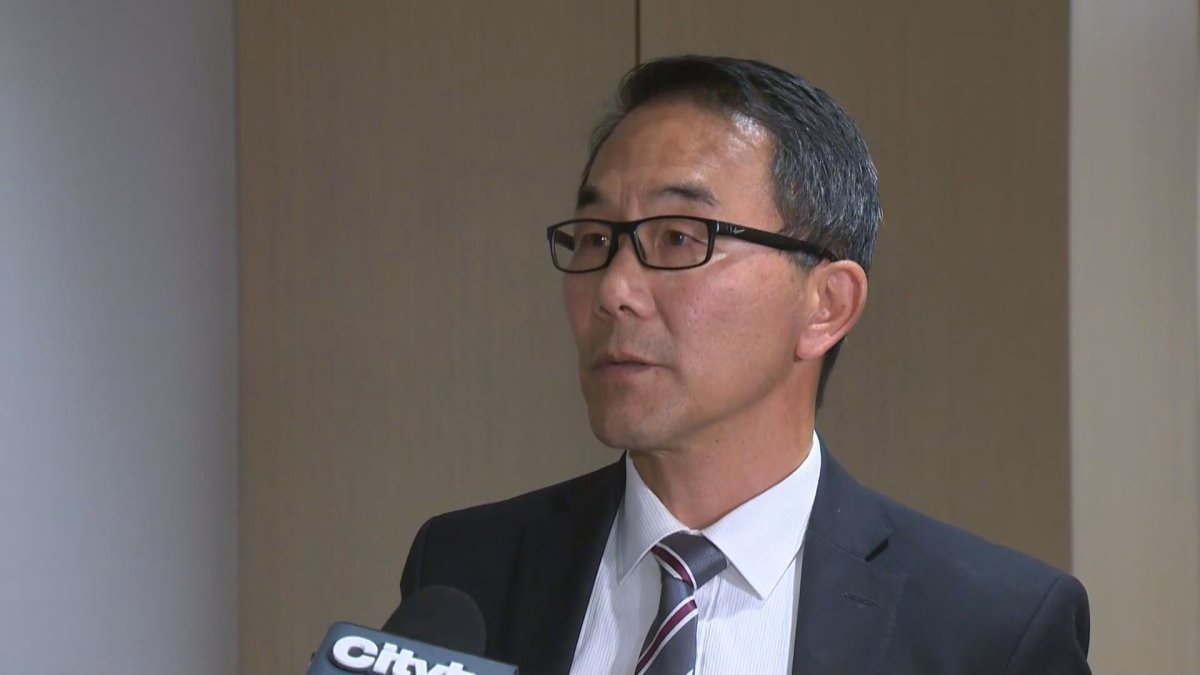Some policies and processes were not properly followed by the Calgary Police Service following a sexual assault allegation against then-officer Sean Chu, an investigation by the Calgary Police Commission found.

The civilian oversight body released its report on Thursday. Chu is currently a city councillor.
The report said how a youth was communicated with following the complaint was mishandled, as well as when the disciplinary investigation was completed.
According to a timeline in the report, while a member of the CPS, Chu met two youths in a restaurant in mid-August 1997. One of those youths reported that, after giving the other a ride home, Chu sexually assaulted her and she then reported the incident to a school resource officer a week later.
The CPS sex crimes unit began investigating the incident that month and the youth was told it was being reviewed by the Crown Prosecution Service, a usual step when criminal charges are being considered.
In January 1998, a letter from the Crown to the sex crimes unit said criminal charges were not supported. CPS told the youth it would start an internal disciplinary investigation, which the commission said did not occur.
The next month, the youth was told her complaint was only being investigated as a criminal matter and was given details on how to make a police conduct complaint about Chu.
She filed complaints against the officers who investigated the criminal case. Those complaints were dismissed in July 1998. The youth appealed that decision to the Law Enforcement Review Board (LERB) in August 1998, which resulted in the board advising CPS to investigate whether Chu should face internal discipline for the sexual assault allegations.
In October 1999, Chu appealed the LERB decision to the Alberta Court of Appeal, saying the LERB did not have legal authority to direct an internal disciplinary investigation. That appeal was successful in March 2002.

Get breaking National news
In February 2002, the youth filed a formal police misconduct complaining against Chu for the alleged 1997 incident, and following an investigation, had a disciplanary hearing ordered in April 2002.
The police chief at the time closed the hearing to the public, but the youth was in attendance for the January 2003 hearing. Chu was handed a five-year reprimand and was ordered to work with an internal ethics council. That reprimand was removed from his record after five years, per Alberta’s Police Service Regulation.
The youth, who had become an adult woman, appealed the LERB decision, but that appeal was dismissed when she did not attend “several” scheduled hearings.
Lacking ‘compassionate support’
The commission said the errors created delay and mistrust in the process.
“A teenage girl came to the service with serious allegations about an officer and the service did not provide her with the compassionate support she needed to navigate a complex and intimidating process.
“It was not okay then and it would not be okay now,” commission chair Shawn Cornett said in a statement.
The report found the youth was under the impression she was a complainant filing a public complaint, not an internal investigation, and thought she would receive regular updates. When she was told the matter was being criminally prosecuted, she was reassured there would be an internal investigation, “though that investigation does not appear to have been completed.”
The differences between a public complaint and internal investigation do not appear to have been explained to her, the report said, something that could have avoided subsequent complaints from the youth.
The commission said there’s no current policy to explain the difference between a public and internal complaint, but noted the CPS website now provides information on how to file a complaint and some possible resolutions.
The police commission report also found that if the matter had been treated as a public complaint, the youth would have received the correct information on whether Edmonton’s or Calgary’s Crown Prosecution Service was reviewing the file.
The report noted better communication could have prevented the issues from getting worse.
The youth also did not receive a public complaint form, which is supposed to happen under police policy.
The Calgary Police Commission does not have the legal ability to reopen the case.
The report, penned by public complaint director Deborah Petriuk, looked at whether police followed their policies regarding complaints like this, whether policy gaps existed, and whether those gaps are still in place.
Recommendations that came from the review of the 1997 incident have already been put into practice by CPS since then.
The report noted that were a similar scenario to happen now, the Alberta Serious Incident Response Team (ASIRT) would investigate serious or sensitive allegations of police misconduct.
The commission’s review did not review the criminal investigation, the decision around charges, or Chu’s fitness for public office – all topics outside of the police commission’s legal authority.














Comments